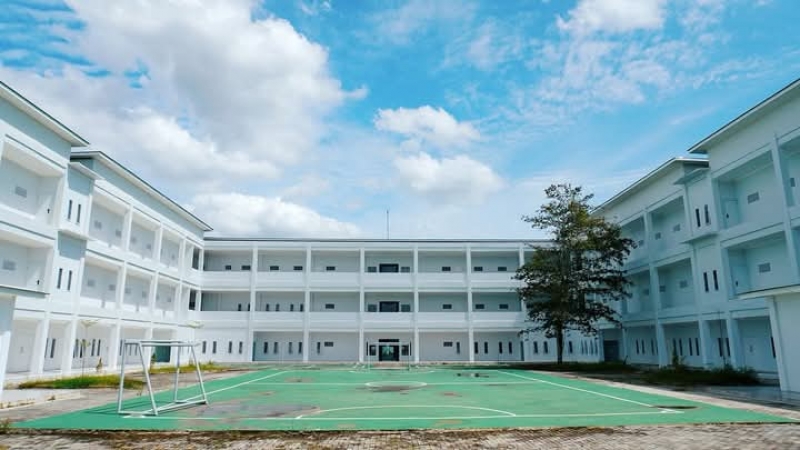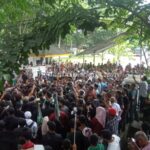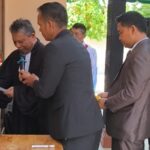Despite being inaugurated in January 2025, the construction of Social Shelter Phase II, located on Bunga Turi II Street in Medan Tuntungan District, Medan, carried out by the Housing, Residential Areas, and Spatial Planning Office (PKPPR)—now renamed the Housing, Residential Areas, Public Works, and Spatial Planning Office (PKPCKTR) of Medan—has been flagged as a finding by the Supreme Audit Agency (BPK) of Indonesia.
The project, executed under the leadership of the then-head of PKPPR, consumed a budget of Rp 51.55 billion sourced from the 2022 Medan City Regional Budget (APBD).
Audit results revealed a late-work penalty of Rp 4.13 billion and an unsubmitted project performance bond of Rp 2.57 billion, totaling Rp 6.6 billion not yet deposited into the Medan City regional treasury.
According to the 2023 BPK audit report, the delay penalty arose because PT BM, the contractor, failed to complete the project within the 240-day deadline, which ran from April 22 to December 27, 2022.
The BPK report noted a 90-day delay. Despite two contract extensions—first via Addendum No. 09.04/PPK-APBD-DPKPPR/ADD/XII/2022 on December 25, 2022, extending the deadline to February 10, 2023, and then via Addendum No. 09.04/PPK-APBD-DPKPPR/ADD-II/II/2023 on February 11, 2023, further extending it to March 22, 2023—PT BM still did not complete the work on time.
Consequently, the PKPPR Office terminated PT BM’s contract on March 20, 2023, requiring the company to deposit the Rp 2.57 billion performance bond into the regional treasury.
The Acting Head of Medan’s Financial and Asset Management Agency (BPKAD) confirmed that PT BM, as the project contractor, had settled the compensation claim (TGR) with the regional treasury.
The TGR payment was made in two installments—on June 18 and July 14, 2025—totaling Rp 945 million, deposited into the Medan City regional treasury by the PKPCKTR Office.
However, no deposit proof was provided when questioned about whether the agency received a copy of PT BM’s payment receipt.
Meanwhile, the Medan District Prosecutor’s Office has reportedly summoned several individuals for questioning regarding the social shelter project.
The Head of the Special Crimes Section confirmed the summonses, stating that statements were still being collected as some matters remained unresolved.
Those questioned included officials from the Housing Agency and PT BM representatives.
The prosecutor’s office declined to disclose the identities of the summoned individuals but confirmed that PT BM had deposited Rp 945 million into the Medan City regional treasury.
This amount was adjusted based on the unpaid 7% progress to third parties and findings from the Inspectorate, leaving the remaining payable sum at Rp 945 million.
Social Shelter Phase II
“Social Shelter Phase II” is a cultural and community space in Cambodia, often associated with contemporary art and social initiatives. It emerged as part of a broader effort to provide a platform for local artists, activists, and marginalized groups to express themselves and engage with the public. While specific historical details may vary, such spaces often reflect Cambodia’s post-conflict cultural revival and grassroots movements.
Bunga Turi II Street
Bunga Turi II Street appears to be a local road, possibly in Indonesia (given the name’s linguistic roots), but there is limited widely documented history or cultural significance available. If it is located in a specific city or region, it may hold local importance, such as being part of a residential or commercial area. For more details, further context about its location would be needed.
Medan Tuntungan District
Medan Tuntungan District is a sub-district (kecamatan) in Medan, North Sumatra, Indonesia, known for its mix of urban and semi-rural areas. Historically, it was part of the Deli Sultanate’s influence and later developed as a residential and agricultural region. Today, it serves as a gateway to Medan from the southern highlands, with cultural and economic ties to the surrounding Batak and Malay communities.
Housing, Residential Areas, and Spatial Planning Office (PKPPR)
The *Housing, Residential Areas, and Spatial Planning Office (PKPPR)* is a government or municipal department responsible for managing urban development, housing policies, and land-use planning. Its history is tied to urbanization efforts, ensuring sustainable residential growth and efficient spatial organization in cities. The office plays a key role in regulating construction, infrastructure, and community living standards.
Housing, Residential Areas, Public Works, and Spatial Planning Office (PKPCKTR)
The *Housing, Residential Areas, Public Works, and Spatial Planning Office (PKPCKTR)* is a governmental or municipal body responsible for urban development, housing policies, infrastructure projects, and land-use planning. Its history is tied to the modernization and regulation of urban spaces, ensuring sustainable growth and efficient public works management. The office plays a key role in shaping residential and public environments through zoning, construction oversight, and spatial organization. (Note: Specific historical details may vary by region, as similar offices exist in different countries under slightly different names and mandates.)
Supreme Audit Agency (BPK) of Indonesia
The **Supreme Audit Agency (Badan Pemeriksa Keuangan or BPK)** of Indonesia is the country’s highest state institution responsible for auditing the management and accountability of government finances. Established in 1947, it operates independently under the 1945 Constitution to ensure transparency and accountability in public spending. Modeled after the Dutch *Algemene Rekenkamer*, BPK plays a crucial role in Indonesia’s governance by auditing central and regional budgets and reporting findings to legislative bodies.
Medan City Regional Budget (APBD)
The Medan City Regional Budget (APBD) is the annual financial plan of Medan, Indonesia, outlining revenue and expenditure for public services and development. It reflects the city’s priorities in infrastructure, education, healthcare, and economic growth, managed by local government in line with national fiscal policies. Historically, Medan’s APBD has evolved to address urbanization challenges and promote regional development as the city grows as a major economic hub in Sumatra.
Medan District Prosecutor’s Office
The Medan District Prosecutor’s Office is a government institution in Medan, Indonesia, responsible for legal enforcement and prosecution within its jurisdiction. Established as part of Indonesia’s judicial system, it plays a key role in upholding justice by investigating and prosecuting criminal cases. While specific historical details about its founding are limited, it operates under the broader framework of Indonesia’s Attorney General’s Office, which was formalized after the country’s independence in 1945.






